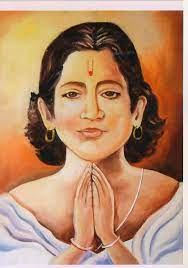

By Vinay Nalwa
Basant Panchami, the festival of spring when Goddess of knowledge and art is revered and prayed and which marks the onset of Spring in northern India is also a reminder of the unforgettable supreme sacrifice of fourteen-year-old Haqiqat Rai. Different sources give different dates of his death, including 1732, 1735, 1742 and 1791.
Haqiqat Rai preferred painful death over forced conversion to Islam. It was the time when the indigenous faith and culture faced the wrath of invaders. Every barbaric method, even temptations were used to destroy the religious identity of Bhartiya’s, so that the system of common shared heritage gets erased from the nation’s memory. However, they were not able to succeed and his firm beliefs in Hindu Dharma and determination to remain a Hindu even against the threat to his life stirred many. His brutal killing on the day of Basant Panchami Festival became a day of remembrance when Hindus used to gather at his samadhi in Sialkot (now in Pakistan).
Bharat has faced religious persecution from the time Turks set their foot on its soil. They lived and flourished through its rich resources and tried to impose their foreign culture. This is the history of that Part of Bharat which became part of Islamic state of Pakistan where the concept of co-existence is missing even today. Hindu -Sikh gatherings on samadhi of Haqiqat Rai has been challenged time and again and is seen as the celebration of the deed of insult to the Holy Prophet (PBUH) by a Hindu called Haqiqat Rai. The Sikhs were also involved because Ranjit Singh took part in the celebrations.
Ganesh Das has given a detailed account of Haqiqat Rai’s life and events surrounding it in ‘ Char Bagh-i-Panjab’, a historical and rare text:
“Another samadhi dedicated to Haqiqat Rai is in Boeli of Baba Bhandari, where people gather and pay obeisance to Haqiqat Rai during Basant Panchami. In Gurdaspur district, a shrine dedicated to him is located at Batala. The town also has a samadhi dedicated to Sati Lakshmi Devi, said to be the wife of Haqiqat Rai.
Lala Bhag Mal Puri was a wealthy person of Sialkot. His son Haqiqat Rai was a promising lad of fourteen and like the sons of all those who lived by the pen, he was attending the maktab(school) for acquiring knowledge of all the important branches of learning. In the maktab one day he entered into a discussion with a mullazada(mullah’s student) on a point relating to the composition of verses.
It was here that some of the Muslim students in the mosque spoke ill of the Goddess Bhavani which provoked Haqiqat Rai into a polemic with his fellow students. Silenced by cogent argument on the point, the mullazada accused Haqiqat Rai of disrespect to the Prophet of Islam. The musalmans of the city supported the mullazada without a second thought and demanded that Haqiqat Rai should be punished for his blasphemy. Haqiqat Rai’s parents and the Hindus of the city begged forgiveness on his behalf, but they were given only two alternatives: either Haqiqat Rai should accept Islam or face capital punishment. Bhag Mal bribed the corrupt officials and maulvis and succeeded in getting the case transferred to the court of the provincial governor, Khan Bahadur Zakariya Khan, at Lahore.
When Haqiqat Rai accompanied the escorting soldiers to Lahore, a large number of Muslims from Sialkot and other places also started for Lahore to ensure that one of the alternatives suggested by them was adopted. On the way to Lahore, Haqiqat Rai was not allowed to ride a horse. In Lahore itself the ‘ulama, the Qazi, the muftis and other respectable people were persuaded by the mullahs of Sialkot to accept their version of the situation. Zakariya Khan listened to all the witnesses and, concluded that Haqiqat Rai was innocent. His advisers suggested, however, that it would be highly impolitic to go against the current of Muslim opinion. Zakaria Khan suggested to the boy that he may accept Islam, but he curtly replied: ‘if I become a musalman will I live forever’?
He was then offered the high mansab of three thousand, with a large jagir. But he did not care for these earthly prizes. Zakariya Khan left him then to the discretion of the maulvis. They decreed the punishment of death. Bhag Mal requested that his son may be kept in custody for one night so that he may be persuade him to accept Islam. This request was granted. At night he tried to argue with his son, saying that his life is precious. Haqiqat Rai underlined the narrowness of the creed of the Muslims and the relentlessness of their hostility to others. He told his father that he was not going to accept Islam.
The ring of finality in his decision was so evident that his father and others departed in despair. In the morning, he was stoned nearly to death when he was beheaded by a soldier out of compassion. The Hindus prayed that they may be allowed to cremate him according to Hindu rites. Their prayer was granted. Every Hindu contributed one thing or another towards the arrangements. A flower-seller of Lahore sold flowers worth one hundred and twenty rupees in half a ghari. The garland which he used to sell for half a dam fetched him more than six rupees on that day: such was the feeling among the Hindus of Lahore for the martyr.
A small samadhi was built over the place of his cremation. People hold a fair there on the fifth of every month and regard it as a place of pilgrimage. In Sialkot itself his father made a marhi(Tomb) in his house. That too became a place of pilgrimage.”
(The writer is a Ph.D. in sociology. Views expressed are personal)